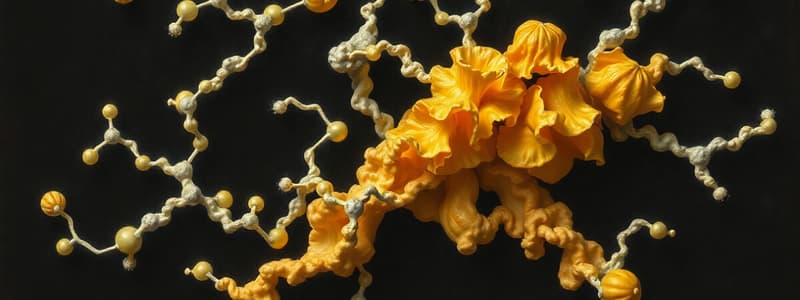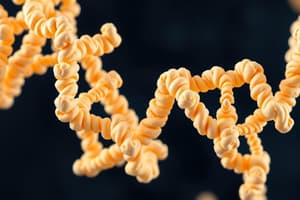Podcast
Questions and Answers
What is the primary function of hormones in the body?
What is the primary function of hormones in the body?
- To transport nutrients across cell walls
- To regulate various systems and functions (correct)
- To act as buffers in acid-base balance
- To serve as enzymes for chemical reactions
Which of the following accurately describes enzymes?
Which of the following accurately describes enzymes?
- They are primarily composed of lipids.
- They speed up chemical reactions. (correct)
- They store energy for immediate use.
- They change shape during chemical reactions.
Which factor is NOT likely to cause deficiencies in enzymes?
Which factor is NOT likely to cause deficiencies in enzymes?
- Illness
- Excessive hormone production (correct)
- Inborn errors in metabolism
- Inadequate nutrition
What role do proteins play in the immune response?
What role do proteins play in the immune response?
How does the body maintain acid-base balance?
How does the body maintain acid-base balance?
What is one of the least efficient functions of proteins?
What is one of the least efficient functions of proteins?
Which protein functions primarily in the transport of nutrients in the bloodstream?
Which protein functions primarily in the transport of nutrients in the bloodstream?
What type of substances are produced by the immune system in response to antigens?
What type of substances are produced by the immune system in response to antigens?
What is the primary role of essential amino acids in the body?
What is the primary role of essential amino acids in the body?
Which process allows the body to create nonessential amino acids?
Which process allows the body to create nonessential amino acids?
What is the significance of peptide bonds in proteins?
What is the significance of peptide bonds in proteins?
How does denaturation affect proteins?
How does denaturation affect proteins?
What role do immune response proteins primarily serve in the body?
What role do immune response proteins primarily serve in the body?
Which factor does NOT affect the denaturation of proteins?
Which factor does NOT affect the denaturation of proteins?
What mechanism serves to maintain fluid balance in the body through proteins?
What mechanism serves to maintain fluid balance in the body through proteins?
Why is the unique sequence of amino acids important for proteins?
Why is the unique sequence of amino acids important for proteins?
What is one of the primary roles of proteins in hormonal regulation?
What is one of the primary roles of proteins in hormonal regulation?
How do proteins function as enzymes in metabolic processes?
How do proteins function as enzymes in metabolic processes?
What does protein turnover refer to in the body?
What does protein turnover refer to in the body?
In what way do proteins contribute to the immune response?
In what way do proteins contribute to the immune response?
Which of the following best illustrates the role of proteins in metabolic regulation?
Which of the following best illustrates the role of proteins in metabolic regulation?
Which of the following amino acids are considered essential?
Which of the following amino acids are considered essential?
What characterizes conditionally essential amino acids?
What characterizes conditionally essential amino acids?
What is a potential risk of consuming too much dietary protein?
What is a potential risk of consuming too much dietary protein?
Which of the following best describes the types of vegetarian diets?
Which of the following best describes the types of vegetarian diets?
Which of the following groups is likely to require additional protein?
Which of the following groups is likely to require additional protein?
Which of the following is a consequence of protein energy malnutrition?
Which of the following is a consequence of protein energy malnutrition?
Which of the following dietary sources provides complete proteins?
Which of the following dietary sources provides complete proteins?
What is a potential health benefit of maintaining a vegetarian diet?
What is a potential health benefit of maintaining a vegetarian diet?
What is a primary role of histidine in the body?
What is a primary role of histidine in the body?
Which statement about isoleucine is true?
Which statement about isoleucine is true?
What function does leucine serve during physical exercise?
What function does leucine serve during physical exercise?
Which of the following roles is lysine NOT involved in?
Which of the following roles is lysine NOT involved in?
Valine is particularly important for which of the following processes?
Valine is particularly important for which of the following processes?
What is the narrow pH range the body maintains?
What is the narrow pH range the body maintains?
Which mechanism primarily helps the body regulate its pH levels?
Which mechanism primarily helps the body regulate its pH levels?
What happens to the body's pH level in acidic conditions?
What happens to the body's pH level in acidic conditions?
What role do proteins play in pH regulation?
What role do proteins play in pH regulation?
Why is it important for the body to maintain its pH level within a narrow range?
Why is it important for the body to maintain its pH level within a narrow range?
Flashcards are hidden until you start studying
Study Notes
Proteins
- Contain carbon, hydrogen, oxygen, and nitrogen
- Protein also supplies energy (4kcal/g), but it is not the primary function
- Units of protein are made up of amino acids
Amino Acids
- Building blocks of protein
- Have a central carbon connected to four side groups: Amino group, Acid group (carboxyl), Hydrogen group, and R group (side chain)
- R group is unique in each different amino acid
- Two categories: Essential and Non-essential
Essential Amino Acids
- Must be acquired from our diet
Nonessential Amino Acids
- Normally made by the body in adequate amounts
- Transamination is a process in which the amine group is transferred from one molecule to another to create an amino acid
- Conditionally Essential amino acids
Amino Acid Sequencing
- Different proteins have a unique sequence of amino acids
- These amino acids are linked together by Peptide bonds
Shape and Protein Function
- Correct amino acid sequence leads to predictable structure and function
- Incorrect amino acid sequence can change the structure and cause errors in function (Ex: Sickle cell anemia)
- Shape dictates protein function
Denaturation of Proteins
- The physical properties of a protein can be altered
- A protein’s structure can be changed by heat, acid, enzymes, agitation, or alcohol.
- Denaturation (Ex: Cooking an egg or stomach acid denatures proteins we eat)
Functions of Protein in the Body
- Fluid Balance: Proteins in blood maintain optimal balance between the fluids inside and outside cells and blood vessels
- Albumin is a protein in the blood that helps maintain the fluid balance
- Edema can develop when the blood albumin is low
Acid-Base Balance
- Acids and bases are constantly being produced by the body’s metabolic processes
- The body works to maintain pH (acid-base balance) in a tight range
- Proteins act as buffers to neutralize acidic and basic conditions
Immune Function
- Foreign substances that enter the body and trigger an immune response are called Antigens
- Proteins form the body’s first barriers against immune invaders, like the skin and mucus
- Immunoglobulins (Antibodies), proteins are produced by the immune system in response to antigens
- Antibodies help fight infections
Enzymes
- Speed up chemical reactions
- Made up of strings of 100 to 1,000 amino acids
- Have a unique shape
- Deficiencies in enzymes can be caused by genetic factors or other reasons like illness, malnutrition, and medications
Hormones
- Messengers that help regulate various systems and functions of the body
- Made of lipids or proteins (Ex: Insulin (protein), estrogen (lipids))
Transport
- Transport substances across cell walls (Ex: Sodium-potassium pump)
- Transporter of nutrients through the bloodstream (Ex: Retinol-binding protein)
- Proteins with water-repelling and water-attracting ends allow for interaction with fats and water (Ex: Lipoproteins)
Energy
- Energy production is the least efficient function of proteins
- No major storage form for immediate use
- The body uses protein for energy as a last resource
- Amino acids are the building blocks of proteins
Protein Turnover
- The continuous breakdown and synthesis of protein molecules in the body
- Essential for growth, repair, and maintenance
Dietary Sources of Protein
Complete Proteins
- Contain all 9 essential amino acids
- Ex: Animal products like meat, poultry, fish, eggs, dairy products
- Soy products are a good source of complete proteins
Incomplete Proteins
- Lack one or more essential amino acids
- Ex: Plant based sources like grains, beans, nuts, seeds
- Combining different plant-based proteins can create a complete protein profile
DRIs for Protein
- Recommended Daily Intake (RDI) is 0.8 grams per kilogram of body weight
- Varies based on individual needs and factors like age, activity levels, and health conditions
Vegetarian Diets
- People who choose to restrict animal products from their diet
- Types of Vegetarian Diets: Vegan, lacto-vegetarian, ovo-vegetarian, lacto-ovo vegetarian, pescetarian
Health Benefits of Vegetarian Diets
- Reduced risk of heart disease, type 2 diabetes, certain cancers, and obesity
- Improved digestion and bowel health
Potential Nutrient Deficits in Vegetarian Diets
- Vitamin B12, Iron, Zinc, Calcium, Omega-3 Fatty Acids
Protein-Energy Malnutrition
- A condition caused by insufficient intake of protein and calories
Marasmus
- A severe form of protein-energy malnutrition characterized by severe wasting and emaciation
Kwashiorkor
- A form of protein-energy malnutrition characterized by edema, skin lesions, and impaired growth
Negative Effects of Too Much Protein
- Increased risk of kidney stones, bone loss, and dehydration
- May also contribute to an increased risk of certain cancers
Amino Acid Structure
- A central carbon atom (alpha carbon)
- An amino group (NH2)
- A carboxyl group (COOH)
- A hydrogen atom (H)
- A side chain (R group) - unique to each amino acid
Essential, Non-Essential, and Conditionally Essential Amino Acids
- Essential amino acids: Cannot be synthesized in the body and must be obtained from the diet.
- Non-essential amino acids: Can be synthesized in the body.
- Conditionally essential amino acids: Normally non-essential but become essential under specific conditions, such as illness or infancy.
Essential Amino Acids
- Histidine
- Isoleucine
- Leucine
- Lysine
- Methionine
- Phenylalanine
- Threonine
- Tryptophan
- Valine
Conditionally Essential Amino Acids
- Arginine
- Cysteine
- Glutamine
- Glycine
- Proline
- Tyrosine
Functions of Proteins in the Body
- Structural components of tissues and organs (e.g., muscle, bone, skin, hair)
- Enzymes: Catalyze biochemical reactions.
- Hormones: Regulate physiological processes.
- Antibodies: Part of the immune system, defend against disease.
- Transport: Carry nutrients and gases throughout the body.
- Fluid balance: Maintain appropriate fluid levels.
- Energy source: Can be used for energy when carbohydrates and fats are insufficient.
Protein Turnover
- The continuous breakdown and synthesis of proteins in the body.
- Essential for maintaining and repairing tissues, and adapting to changing physiological needs.
- Influenced by factors like age, nutrition, and physical activity.
Dietary Sources of Complete and Incomplete Proteins
- Complete proteins: Contain all nine essential amino acids.
- Complete protein examples: Animal products such as meat, poultry, fish, eggs, dairy.
- Incomplete proteins: Lack one or more essential amino acids.
- Incomplete protein examples: Legumes, grains, nuts, seeds.
Soy Protein Nutrients
- Nutrients: Protein, fiber, iron, calcium, potassium, magnesium, folate.
- Non-nutritive substances: Soy isoflavones, which have potential health benefits.
DRIs for Protein
- 0.8 grams of protein per kilogram of body weight per day for adults.
- Higher needs for children, adolescents, pregnant and lactating women, athletes, and individuals with certain medical conditions.
Individuals Who May Need Additional Protein
- Athletes
- Pregnant and lactating women
- Individuals with burns or other injuries
- Individuals with certain chronic diseases
- Older adults
Types of Vegetarian Diets
- Lacto-ovo-vegetarian: Eat dairy products and eggs.
- Lacto-vegetarian: Eat dairy products but not eggs.
- Ovo-vegetarian: Eat eggs but not dairy products.
- Vegan: Do not consume any animal products.
Health Benefits and Potential Nutrient Deficits of Vegetarian Diets
- Health Benefits: Lower risk of chronic diseases, such as heart disease, type 2 diabetes, and some types of cancer.
- Potential Nutrient Deficits: Vitamin B12, iron, calcium, zinc, omega-3 fatty acids.
Protein Energy Malnutrition (PEM)
- A condition resulting from inadequate intake of protein and calories.
- Two main forms: Marasmus and Kwashiorkor.
Marasmus
- Severe calorie deficiency
- Wasting of muscle and fat tissue
- Slowed growth and development
Kwashiorkor
- Inadequate protein intake, but calorie intake may be adequate.
- Swelling in the abdomen and legs
- Hair loss and pigmentation changes
Negative Effects of Too Much Dietary Protein
- Increased risk of kidney stones
- Increased calcium loss, potentially leading to osteoporosis
- Increased risk of heart disease, especially if protein sources are high in saturated fat.
Essential Amino Acids
- Essential amino acids cannot be produced by the human body and must be acquired through diet.
- Histidine
- Plays a role in protein synthesis, enzyme function, and cellular metabolism.
- Precursor for histamine, involved in immune response and gastric acid secretion.
- Isoleucine
- One of the Branched-Chain Amino Acids (BCAAs).
- Participates in muscle repair, energy production, and immune function.
- Important for hemoglobin formation.
- Leucine
- Another BCAA crucial for muscle protein synthesis.
- Regulates blood sugar levels and provides energy during exercise.
- Involved in the production of growth hormones.
- Lysine
- Essential for protein synthesis, hormone production, and enzyme function.
- Important for the production of collagen and elastin, contributing to tissue repair.
- Plays a role in calcium absorption and immune function.
- Valine
- A BCAA that supports muscle metabolism and tissue repair.
- Helps stimulate muscle growth and regeneration.
- Involved in energy production during exercise.
- Methionine
- Contains sulfur and acts as a precursor to other amino acids and compounds like cysteine.
- Plays a role in methylation processes and detoxification.
- Important for protein synthesis and acts as an antioxidant.
- Pentylamine
- Not traditionally categorized as an essential amino acid.
- Involved in metabolic processes.
- May play a role in neurological functions and the synthesis of certain biomolecules.
- Threonine
- Vital for protein synthesis and immune function.
- Important for the formation of collagen and elastin.
- Involved in fat metabolism and can aid in digestive health.
- Tryptophan
- Precursor for serotonin, affecting mood and sleep.
- Plays a role in melatonin production, influencing sleep cycles.
- Important for niacin (vitamin B3) synthesis.
Body's pH Regulation
- The human body keeps its pH levels within a very narrow range, typically between 7.35 and 7.45.
- This narrow range is essential for optimal functioning of crucial processes, including enzyme activity and maintaining cell integrity.
- Proteins within the body act as buffers, playing a vital role in neutralizing acids and bases.
- This buffering action helps prevent drastic fluctuations in pH, ensuring a stable internal environment.
Studying That Suits You
Use AI to generate personalized quizzes and flashcards to suit your learning preferences.




